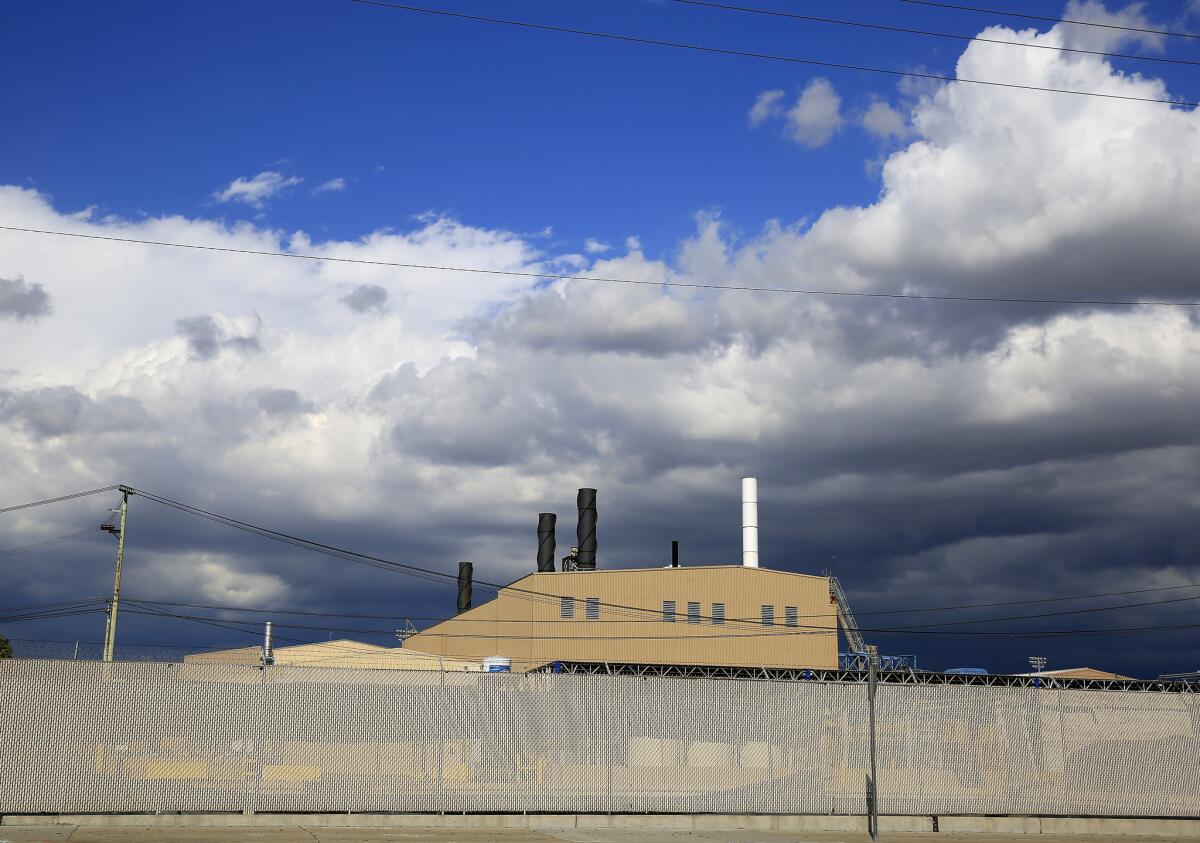Exide cleanup: L.A. County supervisor wants independent oversight

The now-shuttered Exide Technologies battery recycling plant in Vernon.
- Share via
A Los Angeles County supervisor is urging California Gov. Jerry Brown to appoint an independent expert to oversee a soil cleanup of potentially thousands of lead-contaminated homes surrounding a shuttered battery recycling plant in Vernon.
Supervisor Hilda Solis, who represents communities around the Exide Technologies plant, says outside oversight is needed to ensure a swift cleanup of homes contaminated by decades of air pollution from the facility, and to overcome temptation by state officials and the company to delay action for financial reasons.
The California Department of Toxic Substances Control, which is overseeing the cleanup of soil contaminated by the facility’s lead emissions, announced last week that soil testing shows the facility deposited toxic dust across a wider area of southeast L.A. County than previously estimated, possibly fouling as many as 10,000 homes.
Lead is a powerful poison that can cause learning disabilities, behavioral problems and diminished IQs in children, who can ingest the dust when they play in the dirt. Removing the metal from thousands of homes would become the largest cleanup of its kind in California and could ultimately cost hundreds of millions of dollars.
Solis said the governor’s office must intervene to ensure the state toxic substances department acts with greater urgency and is able to secure funds to pay for the immediate cleanup of the 1,000 most contaminated properties.
“We can’t afford to wait another week, two weeks,” Solis said in an interview. “We need immediate action.”
Solis also called for the state to establish a commission to investigate the long history of pollution at Exide, to look into “what exactly happened and who is responsible.”
The governor’s office did not immediately respond to a request for comment.
California officials allowed the battery recycler to operate for 33 years with only a temporary permit, even as it racked up dozens of violations for releasing pollution into the air and water, sparking fierce protest from community groups and lawmakers.
In March, Exide struck a deal with the U.S. attorney’s office to shut down the lead-acid battery smelter, which had been in operation since 1922. To avoid criminal charges, the Georgia-based company agreed to spend $50 million to clean and demolish the plant and to remove lead from the soil of surrounding homes.
Exide has said its contributions to lead in the soil were small relative to other sources, such as lead-based paint in older homes, and that contamination from the plant is limited to nearby industrial zones.
A company spokeswoman declined to comment Thursday.
Solis’ comments echo the demands of community groups who have accused state toxics regulators of being slow to acknowledge the extent of contamination in their neighborhoods and of dragging their feet with the cleanup. Over the last year, the department has removed and replaced lead-contaminated soil from the 146 homes closest to the plant in Maywood and Boyle Heights, at a cost of about $45,000 each.
But the idea could face an uphill battle in Sacramento.
Senate leader Kevin de Leon (D-Los Angeles), a past critic of the state’s regulation of Exide and other hazardous waste operations, said Thursday that he does not support outside oversight because it would add “more layers of bureaucracy.”
“The bureaucrats at the county and state need to stop pointing fingers at each other,” De Leon said. “A better use of their time is cleaning up the neighborhoods and making sure Exide pays for it.”
The call for independent oversight and investigation comes ahead of a public meeting that toxics regulators and air quality officials have scheduled on the Exide matter Thursday evening at the Huntington Park Community Center. Solis first raised the idea Wednesday in opinion articles published in the Huffington Post and La Opinion.
“The public deserves a thorough and independent investigation into what happened and why it was allowed to happen,” Solis wrote. “It seems inarguable that the institutions charged with protecting these communities failed to fulfill this duty. We must not let this happen again.”
For more environment news, follow me @tonybarboza on Twitter.
More to Read
Sign up for Essential California
The most important California stories and recommendations in your inbox every morning.
You may occasionally receive promotional content from the Los Angeles Times.











